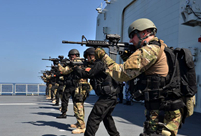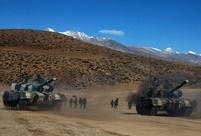 Army aviation: Adding wings to infantry
Army aviation: Adding wings to infantry
 Old photos of Chinese President Xi Jinping’s father and his families
Old photos of Chinese President Xi Jinping’s father and his families
 Bikini show in 2014 China Final of Miss Tourism World
Bikini show in 2014 China Final of Miss Tourism World
 Close-up view of August Aerobatic Team
Close-up view of August Aerobatic Team
 Goddesses married in 2014
Goddesses married in 2014
 Polar region photos raise worldwide awareness of global warming
Polar region photos raise worldwide awareness of global warming
 Get off at the last stop — Beijing Subway in vision
Get off at the last stop — Beijing Subway in vision
 Top 100 beauties in the world!
Top 100 beauties in the world!
 Gallery: Who is the most beautiful one?
Gallery: Who is the most beautiful one?
 If you like autumn, put your hands in the air!
If you like autumn, put your hands in the air!
TEHRAN, Dec. 30 -- With the extension of the deadline for a comprehensive deal on Iran's nuclear issue, the 12-year-long diplomatic efforts over Iran's controversial nuclear program has come to a historical juncture.
In a recent letter to his counterparts of the P5+1 bloc -- China, France, Russia, Britain, the United States and Germany, Iranian Foreign Minister Mohammad-Javad Zarif said Iran is confident that "a comprehensive agreement is imminently within reach."
MAJOR DEVELOPMENTS IN 2014
On Nov. 24, 2013, an interim deal, which included initial reciprocal measures to be taken by both sides for a duration of six months, was signed in Geneva, demanding that Iran suspend some sensitive nuclear activities in exchange for limited sanction relief to boost diplomatic efforts to resolve the issue.
Before the six-month deadline, Ali-Akbar Salehi, head of Atomic Energy Organization of Iran, said that Iran planned to drastically reduce plutonium output at the Arak heavy water reactor in a bid to dilute western doubts over the country's controversial nuclear activities.
In July, Iran's Supreme Leader Ayatollah Ali Khamenei said Iran's uranium enrichment capacity was one of the major differences between Iran and the West.
"They seek to make Iran accept 10,000 SWUs (Separative Work Units) ... but Iran's absolute need stands at 190,000 SWUs," said Khamenei.
Also in July, after months of intense talks, negotiators gave themselves four more months until Nov. 24 to strike a deal to scale down Iran's nuclear activities.
In August, Iran said it had started to modify its Arak heavy water reactor and limit its plutonium output.
Foreign ministers from Iran and the P5+1 group agreed on Nov. 24 to extend the deadline of nuclear talks to July 1, 2015, in an attempt to secure the prospect of a deal.
On Dec. 17, a fresh round of the nuclear talks was held in Geneva at deputy foreign ministerial level without deals.
IRAN REMAINS OPTIMISTIC DESPITE CRITICISM
A recent report by the International Atomic Energy Agency (IAEA) said that Iran was continuing to meet its commitments under the Geneva interim nuclear deal as the country was not enriching uranium above 5 percent, and had not expanded its activities at its enrichment facilities and the Arak heavy water reactor.
However, IAEA Director General Yukiya Amano urged Iran last month to fully implement the practical measures agreed upon and cooperate with his organization in a timely manner.
"Iran has implemented most of the practical measures agreed under the framework, but not all of them," said Amano, adding that the IAEA cannot conclude that all nuclear materials in Iran are for peaceful purpose.
Despite those doubts and criticism, Iran remains optimistic about the future of the nuclear talks.
"Although in the recent nuclear talks we could not finalize a comprehensive deal, I could say that forward steps have been taken in the run-up for a final agreement," said Iranian President Hassan Rouhani after the extension in November.
The most important achievement in the talks was the common understanding that negotiations, rather than exertion pressure, are the only way to a final deal, he added.
The world powers have been convinced now that imposing sanctions to pressure Iran is not the right decision, and they have also accepted that Iran can enjoy nuclear technology, including the uranium enrichment program on its soil, he said.
Accomplishments always come with a price. When the negotiators gather under the same roof again next year, they will have to entertain the price they are willing to pay for a final deal.
The talks require "foresight, political will and recognition of realities by our negotiating partners as well as courage to make the right choice benefitting the entire global community rather than succumbing to the whims of vocal, but increasingly unpopular, pressure groups and special interests," said Iranian Foreign Minister Zarif.
 Tempting Yunnan cuisine
Tempting Yunnan cuisine Joint anti-piracy drill
Joint anti-piracy drill PLA conducts tactical drill in Tibet
PLA conducts tactical drill in Tibet Beautiful Chinese woman
Beautiful Chinese woman Chestnut girl goes viral online
Chestnut girl goes viral online Time travel photos become a hit in military academies
Time travel photos become a hit in military academies Unknown 'monster' fish caught in Shandong
Unknown 'monster' fish caught in Shandong 20 years on: Relocated Three Gorges residents through lens
20 years on: Relocated Three Gorges residents through lens PLA HK Garrison veterans leave behind beautiful smiles
PLA HK Garrison veterans leave behind beautiful smiles Making sex safe
Making sex safe Gmail glitch fuels unnecessary speculation
Gmail glitch fuels unnecessary speculation Shenzhen imposes limits on purchases of new cars
Shenzhen imposes limits on purchases of new cars A Hongkonger working with mainland media confronted by both sides in Occupy Central reporting
A Hongkonger working with mainland media confronted by both sides in Occupy Central reportingDay|Week|Month